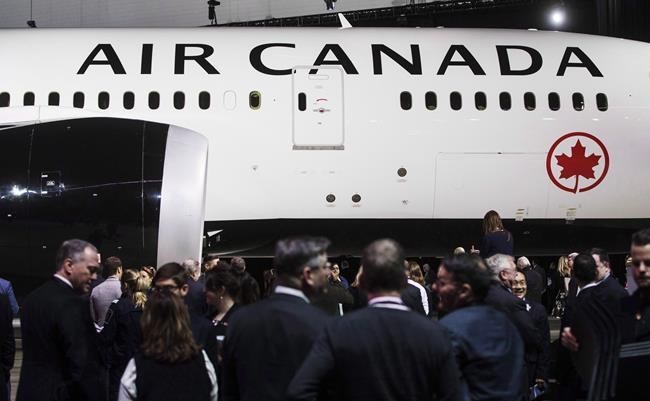
People view the newly revealed Air Canada Boeing 787-8 Dreamliner aircraft at a hangar at the Toronto Pearson International Airport in Mississauga, Ont., Thursday, February 9, 2017. Air Canada says that negative changes to foreign exchange rates drove it to a $231 million net loss in the fourth quarter, but it would have otherwise turned a profit during the three-month period. THE CANADIAN PRESS/Mark Blinch
Republished February 15, 2019 - 2:04 PM
Original Publication Date February 15, 2019 - 5:16 AM
MONTREAL - The head of Canada’s largest airline brushed off concerns about a slowing global economy after business passengers helped the airline top analysts’ earnings expectations last quarter even though fuel prices and currency rates drove it into the red.
“Despite all of the backdrop of the noise that we hear about fears of a recession and the trade wars and the rest of it, we do see a fairly strong and bullish market,” Air Canada chief executive Calin Rovinescu told investors Friday.
Management also dismissed Brexit as a threat in the wake of an air deal signed by Canada and the U.K. in December.
Chief commercial officer Lucie Guillemette noted that capacity has been cut between Canada and China “due to geopolitical issues as well as ongoing competitive pressures” and reallocated to the Atlantic.
Business cabin travellers generated $92 million more revenues in the fourth quarter than in the same period in 2017, a 12.5 per cent bump. Their numbers swelled by more than nine per cent, Air Canada said, boosting passenger revenues 11 per cent year over year to a new record of $3.8 billion in the quarter despite increased competition.
On the other end of the fare scale, a freshly expanded Flair Airlines, soon-to-launch Canada Jetlines Ltd., and WestJet’s eight-month-old, ultra-low-cost Swoop are all crowding the budget airspace that Air Canada's low-cost Rouge set out to occupy in 2012.
“We continue to observe increased competition pressure and capacity from domestic ultra-low-cost carriers in the market and more specifically Alberta regional routes where we have a relatively small presence,” Guillemette said, in a veiled reference to chief domestic rival WestJet Airlines Ltd.
WestJet also aims to challenge Air Canada’s transatlantic dominance. Three of the Calgary-based company’s Boeing 787 Dreamliner aircraft are poised to embark on non-stop service from Calgary to Dublin, Paris and London's Gatwick Airport this spring.
“They’re going to be taking a run at Air Canada on key routes. And it’s not just leisure travel; they also want a slice of business traffic and Europe,” said Robert Kokonis, president of Toronto-based consulting firm AirTrav Inc.
Chief financial officer Michael Rousseau said he expects adjusted CASM — or cost per available seat mile — to increase between two per cent and three per cent in 2019 versus 2018, pointing to new rules that threaten profit margins.
Rovinescu echoed Rousseau's worries over the federal legislation that tacks on tarmac time limits and penalties for airlines as part of a sweeping overhaul of transportation regulations.
“I think that one of the consequences could indeed be the passing on of some of these expenses, because an unintended consequence of this Bill C-49 is that it will drive fares up,” Rovinescu said.
Meanwhile, the company announced it will seek a green light from shareholders later this month to increase its foreign ownership threshold to 49 per cent from 25 per cent, in line with recent changes to the Canadian Transportation Act.
Oil volatility remains an ongoing concern. Air Canada spent $244 million or 29 per cent more year over year on fuel last quarter due to higher prices and a weaker Canadian dollar.
The result was a loss of $231 million or 85 cents per diluted share for the three months ended Dec. 31, compared with a net profit of $8 million or two cents per share in the fourth quarter of 2017.
The airline's adjusted net income, which excludes the impact of foreign exchange fluctuations, was $54 million or 20 cents per share, down from $60 million of 22 cents per share a year earlier.
Total revenue was $4.24 billion, up from $3.82 billion a year earlier.
Analysts had estimated 15 cents per share of adjusted net income and $4.2 billion of revenue, according to Thomson Reuters Eikon.
Analyst Doug Taylor of Canaccord Genuity Group called the results a "strong finish," citing numbers that came in "slightly ahead on all headline metrics given strong traffic growth."
For the full year, Air Canada earned $167 million, down from $2.03 billion in 2017, as jet fuel cost jumped 36 per cent to $3.97 million.
On an adjusted basis, diluted earnings per share fell 40 per cent year over year to $2.45 or $677 million, from $4.11 per share of $1.14 billion a year ago.
On the Toronto Stock Exchange, Air Canada's shares rose $1.17 or 3.7 per cent to close at $33.15.
Companies in this story: (TSX:AC, TSX:WJA)
News from © The Canadian Press, 2019